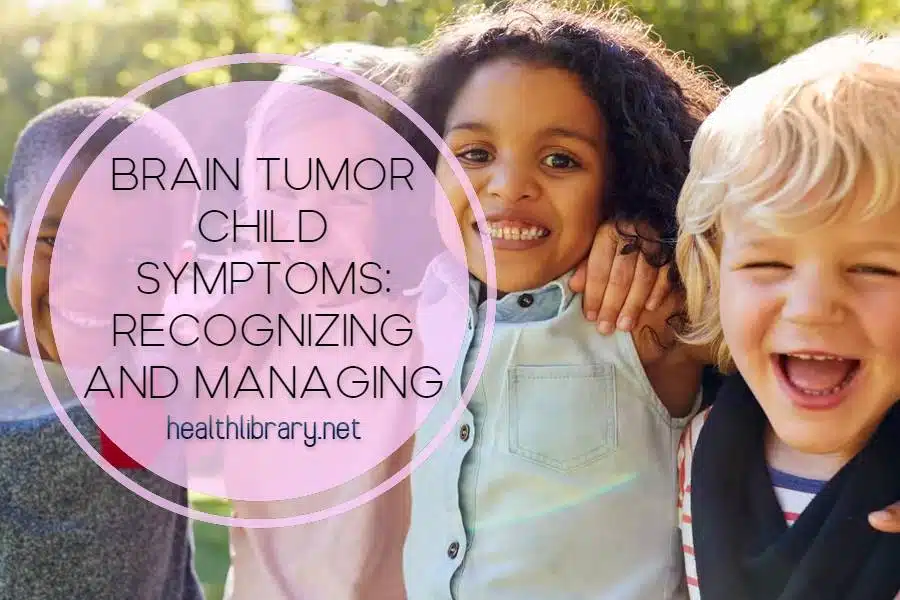Brain tumors can be frightening and overwhelming for any parent, but there are some common symptoms to look out for in children. Early detection, diagnosis and treatment of brain tumor symptoms in children are vital, so it is important to be aware of potential indicators like headache, vomiting or balance issues.

What is the best way to tell if your child has brain cancer?
Children with brain cancer may have a variety of symptoms and indications that vary depending on the kind and location of the tumor. Some frequent signs of childhood brain cancer include:
- Headaches that last or get worse over time
- Vomiting and nausea
- Arms or legs that are weak or numb
- Problems with balance or coordination
- Seizures
- Vision, hearing, speech, or personality changes
- heightened irritation, sleepiness, or perplexity
If your child exhibits any of these symptoms, it is critical that they get medical assistance as soon as possible.
A healthcare provider can perform a physical examination, imaging tests (such as an MRI or CT scan), and other tests to determine the cause of the symptoms and determine an accurate diagnosis.
Read: What is Brain Stem Dead?
Headaches
Headache is one of the most common symptoms of pediatric brain tumors.
These headaches may appear suddenly and without apparent explanation, be chronic or worsen over time, occur first thing in the morning, or recur even after pain treatment.
If your headaches do not appear to be caused by stress or sickness, you should see a doctor as soon as possible.
Vomiting
Vomiting and nausea are frequent symptoms of pediatric brain tumors. Some children may have episodes of vomiting for no apparent reason.
It is critical to record any trends, how long the vomiting lasts, and what appears to cause the vomiting.
Unexplained vomiting or repeated occurrences may suggest a problem in the brain and necessitate medical treatment.
Seizures
Seizures, changes in awareness, and major behavioral abnormalities are all symptoms of a brain tumor.
Changes in alertness, confusion or trouble remaining awake, an inability to concentrate or focus on activities for extended periods of time, new beginnings or worsening mental problems such as anxiety and sadness, increased sleep length, or unusual lethargy are examples of these symptoms.
If any of these symptoms appear, get immediate medical attention from a skilled healthcare expert.
Changes in behavior, personality, or motor skills
Children suffering from brain tumors may experience personality changes such as increased irritability or violence. Motor skill changes, such as an uneven walk or clumsiness, might potentially be indicative of a brain tumor.
Other behavioral changes that children with brain cancer may exhibit include distractibility, trouble following discussions, vocal outbursts, and tantrums.
When these changes happen unexpectedly or for no apparent cause, they should be reported to medical specialists as soon as possible.
Visual disturbances or speech and language difficulties
Visual problems and speech and language impairments in youngsters might be symptoms of a brain tumor.
Visual changes such as double vision, loss of vision, eye discomfort, or swelling of the eyes may indicate a problem. Speech issues are often characterized by difficulty understanding spoken language and slurred syllables.
Other warning indications include trouble reading, writing, or speaking. If your child exhibits any of these symptoms, you should take him or her to the doctor right away.
brain tumor treatment for children
The therapy for a child’s brain tumor will be determined by several criteria, including the kind, size, location, and stage of the tumor, as well as the child’s overall health and age.
Common therapies for pediatric brain tumors include:
Surgery’s purpose is to remove as much of the tumor as is feasible. The type of surgery will be determined by the tumor’s location and size.
Radiation therapy: High-energy beams are used to kill cancer cells and reduce tumors. This medication is often administered externally and might result in adverse effects such as tiredness and hair loss.
Chemotherapy refers to the use of medications to kill cancer cells. This can be administered orally or intravenously and can induce nausea and hair loss.
Targeted therapy is a relatively new type of treatment that targets specific genes, proteins, or the tissue environment that contribute to cancer development and survival.
Supportive treatment may include drugs to control symptoms, therapy to aid with physical and cognitive improvements, and emotional support for the child and their family.
It is critical to remember that each child’s condition is unique and that a treatment plan should be tailored to their specific requirements and established in collaboration with a team of professionals.
Brain tumor child survival rate?
The survival rate for children with brain tumors is determined by several factors, including the kind and stage of the tumor, the child’s age, and general health.
According to the American Brain Tumor Association, children with brain tumors have a 5-year survival rate ranging from 70–90% for low-grade tumors to fewer than 40% for high-grade tumors that have disseminated.
It is vital to note that survival rates are only estimates and cannot be used to forecast what will happen in any given individual’s situation.
Furthermore, even with long-term follow-up and surveillance, many children with brain tumors may live full and active lives.
During this difficult time, it is critical for families to have open and honest discussions with the healthcare team about their child’s prognosis and treatment choices, as well as to get support from healthcare professionals, family, and friends.